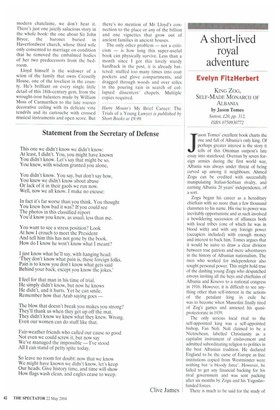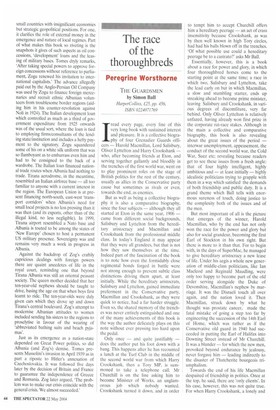A short-lived royal adventure
Evelyn FitzHerbert
KING ZOG, SELF-MADE MONARCH OF ALBANIA by Jason Tomes Sutton, £20, pp. 312, ISBN 0750930772 girason Tomes' excellent book charts the rise and fall of Albania's only king. Of perhaps greater interest is the story it tells of this Ottoman outpost's late essay into statehood. Overrun by seven foreign armies during the first world war, Albania was always under threat of being carved up among it neighbours. Ahmed Zogu can be credited with successfully manipulating Italian-Serbian rivalry, and earning Albania 20 years' independence, of a sort. Zogu began his career as a hereditary chieftain with no more than a few thousand clansmen to his name. His rise to power was inevitably opportunistic and as such involved a bewildering succession of alliances both with local tribes (one of which he was in blood with) and with any foreign power (occupiers included) with enough money and interest to back him. Tomes argues that it would be naive to draw a clear division between true patriots and mere adventurers in the history of Albanian nationalism. The men who worked for independence also sought personal power. This might hold true of the dashing young Zogu who despatched envoys inviting all the beys and chieftains of Albania and Kosovo to a national congress in 1916. However, it is difficult to see anything other than self-interest in the actions of the petulant king in exile he was to become when Mussolini finally tired of Zog's games and annexed his quasiprotectorate in 1939, The only serious local rival to the self-appointed king was a self-appointed bishop, Fan Noli. Noli claimed to be a Nietzschean, labelled Christianity as a capitalist instrument of enslavement and admitted subordinating religion to politics in the best Albanian tradition. He declared England to be the curse of Europe as free institutions copied from Westminster were nothing but 'a bloody farce'. However, he failed to get any financial backing for his rival government and was sent packing after six months by Zogu and his Yugoslavfunded forces.
There is much to be said for the study of small countries with insignificant economies but strategic geopolitical positions. For one, it clarifies the role of external money in the emergence and nature of local regimes. Part of what makes this book so riveting is the snapshots it gives of such aspects as oil concessions, 'development' loans and the leasing of military bases. Tomes dryly remarks, 'After taking special powers to approve foreign concessions without reference to parliament, Zogu renewed his invitation to international capitalists.' The advance allegedly paid out by the Anglo-Persian Oil Company was used by Zogu to finance foreign mercenaries and recruit ethnic Albanian volunteers from troublesome border regions (aiding him in his counter-revolution against Noli in 1924). The Italian development loan which controlled as much as a third of government expenditure from 1925 onwards was of the usual sort, where the loan is tied to employing firms/consultants of the lending state/institution and includes a hefty payment to the signatory. Zogu squandered some of his on a white silk uniform that was so flamboyant as to embarrass even him and had to be consigned to the back of a wardrobe. The Italian loan financed national trade routes when Albania had nothing to trade. Tirana aerodrome, in the meantime, resembled an Italian airforce base — all too familiar to anyone with a current interest in the region. The European Union is at present financing north-south, east-west 'transport corridors' when Albania's need for small local projects is no less pressing than it was then (and its exports, other than of the illegal kind, no less negligible). In 1999, Tirana airport resembled a Nato base and Albania is touted to be among the states of 'New Europe' chosen to host a permanent US military presence. Sovereignty was and remains very much a work in progress in Albania.
Against the backdrop of Zog's craftily capricious dealings with foreign powers there are quaint anecdotes of life in the royal court, reminding one that beyond Tirana Albania was still an oriental peasant society. The queen mother decided that her ten-year-old nephews should be taught to drive, basing the age on that when boys first learnt to ride. The ten-year-olds were duly given cars which they drove up and down Tirana's central boulevard. Zog's attempt to modernise Albanian attitudes to women included sending his sisters to the regions to proselytise in favour of the wearing of 'abbreviated bathing suits and beach pyjamas'.
Just as its emergence as a nation-state depended on Great Power politics, so did Albania (and Zog's) demise. Tomes presents Mussolini's invasion in April 1939 as in part a riposte to Hitler's annexation of Czechoslovakia. It was followed five days later by the decision of Britain and France to guarantee the independence of Greece and Romania. Zog later argued, The problem was to make our crisis coincide with the general crisis. We almost succeeded.'



















































































 Previous page
Previous page